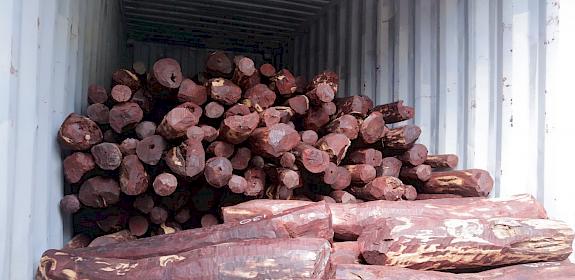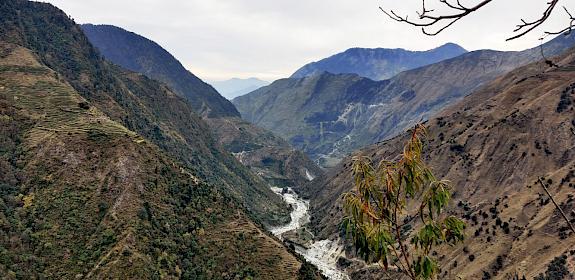Enhancing Practical Skills for Sustainable Trade in Wild Plants in Guangxi
Chongzuo, Guangxi Zhuang Autonomous Region, China, 21st–22nd May, 2018—TRAFFIC, together with its local partners, organised a Community Training Workshop on Sustainable Wild-Harvesting of Gynostemma pentaphyllum and Dendranthema indicumin in Longdeng Village, Chongzuo, in southwest of Guangxi province which borders Viet Nam.

Longdeng, an important harvesting area for wild plants, in particular medicinal and aromatic plant species, is also a community conservation area for the charismatic Francois’ langur Trachypithecus francoisi.
Key participants at the meeting included the accredited FairWild certification body China Standard Conformity Assessment Co., Ltd (CSCA), as well as the Guangxi Biodiversity Research and Conservation Association (BRC), Guangxi Medicinal Plant Research Institute. They were welcomed by administrators of the community conservation areas of Xintuan and Zhonghua, 18 local collectors and villagers, and the representatives of nearby community of Pairu.
The training is part of a project supported by the Critical Ecosystem Partnership Fund (CEPF), aiming at enhancing biological diversity conservation through improved management of wild-sourced plant products harvested by local people in Guangxi.
Application of the FairWild Standard is a practical demonstration of this certification framework for wider uptake in China, in co-operation with project partner CSCA and local implementing partner BRC. Previous successful examples of sustainable wild-harvesting of Schisandra spp. in Sichuan province, were summarised by TRAFFIC as tangible examples to meet expectations from stakeholders in Guangxi.
CSCA introduced the FairWild Standard and its certification requirements, with special emphasis on target species of Longdeng. BRC shared the information about target species resource inventory and explained in detail how to use the Sustainable Collection Manual of Gynostemma pentaphyllum and Dendranthema indicum produced by TRAFFIC.
Prof. Huang, a botanist from Guangxi Medicinal Plant Research Institute, presented the field identification methods, medicinal value, usage, as well as sustainable collection, preliminary processing and storage methods of the two target species.
A field demonstration of sustainable harvesting methods was carried out at one of the locations where target resources are abundant. Collectors followed the guidance from the Sustainable Collection Manual, and collected 4kg of Gynostemma pentaphyllum (weighed using electronic scales provided by the project). These samples were then packaged and recorded according to the FairWild Standard requirements.
Ma Qihuang, the Francois’ langur guard of Longdeng, also known as the ‘monkey king’, demonstrated his full understanding habitat protection and the relevance of sustainable wild harvesting of medicinal plants.
The sustainable collection is an assessment of the environmental change, and the plants are the indicators
Ma Qihuang, Francois’ langur guard of Longdeng“The Longdeng community conservation patrol team will take the role of monitoring the harvesting behaviors, helping the community improve the livelihood and mitigate the threats on the Francois’ langur population.’’
Zhao Xinyi from BRC has participated in many of the field activities during this CEPF-funded medicinal plant project. She has witnessed the growing awareness of the community members in Longdeng. Next step, BRC will spread the sustainable medicinal harvesting and trade concepts to broader areas of Guangxi.
Huang Rui, the FairWild auditor of CSCA also gave the training to the community. He would like to provide long-term technical support to the community to reach the pre-audit in the coming year. He said: “CSCA will closely work with TRAFFIC and BRC to develop other potential sites and wild plant species in China to link the sustainable resources supply to the world’s sustainability product market”.
Notes:
TRAFFIC’s training workshop and the production of communication materials are supported by CEPF and FairWild.
About FairWild

The increasing demand for wild plants—as ingredients for food, cosmetics, well-being and medicinal products—poses major ecological and social challenges. The pressure on potentially vulnerable plant species can endanger local ecosystems and the livelihoods of collectors, who often belong to the poorest social groups in the countries of origin.
As a response to these concerns, the FairWild Foundation is working with partners worldwide to improve the conservation, management and sustainable use of wild plants in trade, as well as the livelihoods of rural harvesters involved in wild collection. TRAFFIC has supported the development of the FairWild Standard, and now hosts the organization’s Secretariat under a partnership agreement.
About CEPF

The Critical Ecosystem Partnership Fund (CEPF) enables civil society to protect the world’s biodiversity hotspots—biologically rich ecosystems that are essential to humanity, yet highly threatened. https://www.cepf.net/





